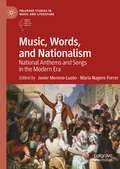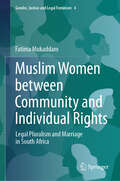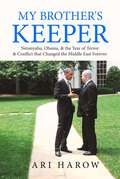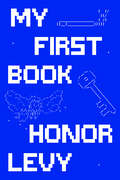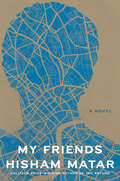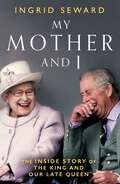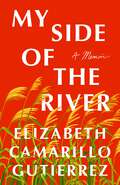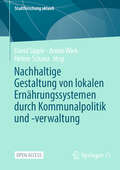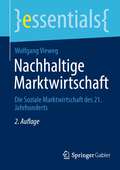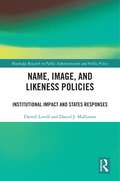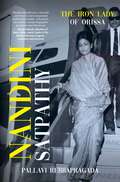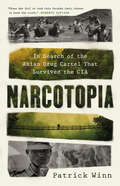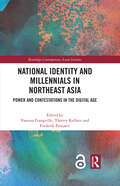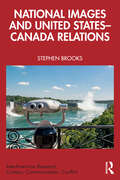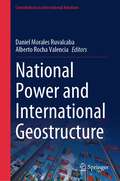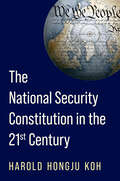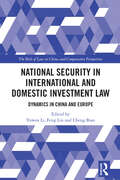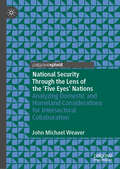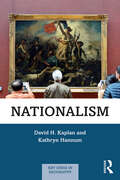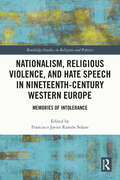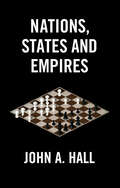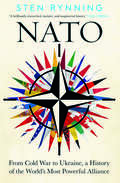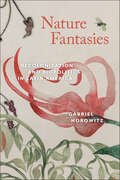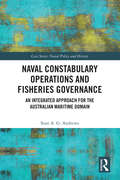- Table View
- List View
Music, Words, and Nationalism: National Anthems and Songs in the Modern Era (Palgrave Studies in Music and Literature)
by Javier Moreno-Luzón María Nagore-FerrerMusic, Words and Nationalism: National Anthems and Songs in the Modern Era considers the concept of nationalism from 1780 to 2020 through anthems and national songs as symbolic and representative elements of the national identity of individuals, peoples, or collectivities. The volume shows that both the words and music of these works reveal a great deal about the defining features of a nation, its political and cultural history, and its self-perception. The book takes an interdisciplinary approach that provides a better understanding of the role of national anthems and songs in the expression of national identities and nationalistic goals. From this perspective, the relationship between hymns and political contexts, their own symbolic content (both literary and musical) and the role of specific hymns in the construction of national sentiments are surveyed.
Muslim Women between Community and Individual Rights: Legal Pluralism and Marriage in South Africa (Gender, Justice and Legal Feminism #4)
by Fatima MukaddamThis book presents an in-depth exploration of the intricate negotiations of married Muslim women within Cape Town’s Muslim communities, navigating the complexities of legal pluralism governed by Muslim Personal Law (MPL). Spanning historical epochs from colonialism to the democratic era, it argues that MPL’s informal status perpetuates patriarchal norms, especially in the domain of marriage. It critically examines the consequences of the non-recognition of Muslim marriages within the civil legal framework and underscores the ambiguous intersections of MPL with broader legal systems, which leaves women in a precarious legal state overshadowed by religious doctrines.Adopting a gender perspective and an interdisciplinary approach that combines political science, sociology, and the law, the book reveals the historical roots of legal pluralism, while also shedding light on the political strategies that have perpetuated gender-stratified citizenship. Despite all the democratic promises, legal pluralism persists, contributing to gender disparities, and the book critically examines the government’s reluctance to address the marginalisation of Muslim women, especially through the lens of the proposed Muslim Marriages Bill (MMB).This book is essential reading for scholars in the fields of law, sociology, and gender studies, offering critical insights into the intersections of legal systems, religion, and gender dynamics within Muslim communities in Cape Town.
My Brother's Keeper: Netanyahu, Obama, & the Year of Terror & Conflict that Changed the Middle East Forever
by Ari Harow&“A useful aid to understanding today&’s headlines as well as Israel&’s recent past.&” –Kirkus Review My Brother&’s Keeper tells the behind-the-scenes story of how the American President and the Israeli Prime Minister clashed about peace, war, and the future of the region.Barack Obama and Benjamin Netanyahu viewed the world—and especially the Middle East—differently. The US president wanted to end what he saw as America&’s perpetual war against the Muslim and Arab worlds, use diplomacy to bring about a Palestinian state coexisting peacefully with Israel, and apply his signature foreign policy vision to reward the Islamic Republic of Iran in exchange for the scaling back of their nuclear pursuits. The Israeli premier wanted his country to thrive without the senseless bloodshed of terror and violence, and he was determined to protect the Jewish state from threats of annihilation by a member of the axis of evil that would one day be armed with nuclear weapons. Netanyahu wanted peace for peace, as well as the acceptance of Israel as a full-fledged part of the Middle East. In 2014, during a pivotal summer of terrorist violence, a war in Gaza, and the advancement of a nuclear deal with Iran, the two men clashed, threatening the US-Israeli strategic alliance and the future of the region. The Middle East would never be the same.
My First Book
by Honor LevyA Most Anticipated Book of 2024 by Good Morning America, W, Nylon, SheReads, and LitHub &“We count on our best young fiction writers to bring us news from the digital nervous system. Honor Levy . . . does so with special bite and élan.&” —Dwight Garner, The New York TimesFrom groundbreaking debut author Honor Levy, stories to delight and ensnareWalking the wire between imagination and confession, My First Book marks the arrival of an electric new talent. Honor Levy&’s uniquely riveting voice emerges from the chaos of coming of age in Generation Z. Never far from a digital interface, her characters grapple with formative political, existential, and romantic experiences in a web-drenched society on the brink of collapse.Inventive, ambitious, and frequently surreal, the stories of My First Book are a mirrorball onto the world as it is. Levy illuminates what it is to be at once adorable, special, heavily medicated, consistently panicked, and completely sincere. One protagonist accompanies a girl with too many teeth through an abortion, while another discovers the infinite nature of love, a third reminisces about other sunsets that were &“pinker, like way pinker,&” and another encounters God in a downtown arcade. To find and keep faith is the order of the day—but how?
My Friends: A Novel
by Hisham MatarA &“masterly&” (The New York Times), &“riveting&” (The Atlantic) novel of friendship, family, and the unthinkable realities of exile, from the Booker Prize–nominated and Pulitzer Prize–winning author of The Return &“[A] personal, deeply felt work . . . looping back and forth through time and memory, building on itself in a process of gradual expansion and revelation . . . quite simply, dazzling&” —Toronto StarThe trick time plays is to lull us into the belief that everything lasts forever, and although nothing does, we continue, inside our dream.One evening, as a young boy growing up in Benghazi, Khaled hears a bizarre short story read aloud on the radio and has the sense that his life has been changed forever. Obsessed by the power of those words—and by their enigmatic author, Hosam Zawa—Khaled eventually embarks on a journey that will take him far from home, to pursue a life of the mind at the University of Edinburgh.There, thrust into an open society that is light years away from the world he knew in Libya, Khaled begins to change. He attends a protest against the Qaddafi regime in London, only to watch it explode in tragedy. In a flash, Khaled finds himself injured, clinging to life, an exile, unable to leave England. To even tell his mother and father back home what he has done, on tapped phone lines, would mark them for death.When a chance encounter in a hotel brings Khaled face to face with Hosam Zawa, the author of the fateful short story, he is subsumed into the deepest friendship of his life. It is a friendship that not only sustains him, but eventually forces him, as the Arab Spring erupts, to confront agonizing tensions between revolution and safety, family and exile, and how to define his own sense of self against those closest to him.A devastating meditation on friendship and family, and the ways in which time tests—and frays—those bonds, My Friends is an achingly beautiful work of literature by an author working at the peak of his powers.
My Friends: A Novel
by Hisham MatarA &“masterly&” (The New York Times, Editors&’ Choice), &“riveting&” (The Atlantic) novel of friendship, family, and the unthinkable realities of exile, from the Booker Prize–nominated and Pulitzer Prize–winning author of The Return&“A profound celebration of the sustaining power of friendship, of the ways we mold ourselves against the indentations of those few people whom fate presses against us.&”—The Washington PostOne evening, as a young boy growing up in Benghazi, Khaled hears a bizarre short story read aloud on the radio, about a man being eaten alive by a cat, and has the sense that his life has been changed forever. Obsessed by the power of those words—and by their enigmatic author, Hosam Zowa—Khaled eventually embarks on a journey that will take him far from home, to pursue a life of the mind at the University of Edinburgh.There, thrust into an open society that is miles away from the world he knew in Libya, Khaled begins to change. He attends a protest against the Qaddafi regime in London, only to watch it explode into tragedy. In a flash, Khaled finds himself injured, clinging to life, unable to leave Britain, much less return to the country of his birth. To even tell his mother and father back home what he has done, on tapped phone lines, would expose them to danger.When a chance encounter in a hotel brings Khaled face-to-face with Hosam Zowa, the author of the fateful short story, he is subsumed into the deepest friendship of his life. It is a friendship that not only sustains him but eventually forces him, as the Arab Spring erupts, to confront agonizing tensions between revolution and safety, family and exile, and how to define his own sense of self against those closest to him.A devastating meditation on friendship and family, and the ways in which time tests—and frays—those bonds, My Friends is an achingly beautiful work of literature by an author working at the peak of his powers.
My Mother and I
by Ingrid SewardThe story of the real relationship between King Charles III and his mother, by the esteemed royal biographer, Ingrid Seward. The relationship between the late Monarch and her son, the King, has long been a subject of fascination. The upbringing of an heir is especially important and places an extra burden on top of all the cares of motherhood. The demands placed on the monarch are unique and there was no one better placed to know this than the late Queen. She knew that not only must they be figureheads, but they must be seen to care for others less fortunate than themselves. They are also expected to uphold family values. Princess Elizabeth made it a point of maternal honour to try and build her routine around her young son while doing her duty. When she became Queen, it was a more delicate balance, but one which she eventually learnt to sustain. Unlike his self-contained mother, who always put duty above personal happiness, King Charles needed love and support to function properly. This is the story of how Charles was shaped and moulded by his heritage. His mother was the woman he always loved but could never be close to. As Queen she held the Pandora&’s box of the crown and all he could do was wait and learn. In his mother&’s old age, he finally received the affection and respect from her he had craved for so long. This book documents his life through many personal anecdotes from his family and his friends, from the moment the guns saluted his birth to the day he was officially declared as the King at his Coronation.
My Side of the River: A Memoir
by Elizabeth Camarillo GutierrezA New York Times Editor's PickA People Magazine Best Book to Read in FebruaryA Goodreads Most Anticipated Book of 2024“My Side of the River is both fierce and poetic. It brilliantly reframes border writing while embracing nature and familial history. There are moments one sees greatness appear. This is one of those moments.” —Luis Alberto Urrea, New York Times bestselling author of Good Night, Irene Elizabeth Camarillo Gutierrez reveals her experience as the U.S. born daughter of immigrants and what happened when, at fifteen, her parents were forced back to Mexico in this captivating and tender memoir.Born to Mexican immigrants south of the Rillito River in Tucson, Arizona, Elizabeth had the world at her fingertips. She was preparing to enter her freshman year of high school as the number one student when suddenly, her own country took away the most important right a child has: the right to have a family. When her parents’ visas expired and they were forced to return to Mexico, Elizabeth was left responsible for her younger brother, as well as her education. Determined to break the cycle of being a “statistic,” she knew that even though her parents couldn’t stay, there was no way she could let go of the opportunities the U.S. could provide. Armed with only her passport and sheer teenage determination, Elizabeth became what her school would eventually describe as an unaccompanied homeless youth, one of thousands of underage victims affected by family separation due to broken immigration laws. For fans of Educated by Tara Westover and The Distance Between Us by Reyna Grande, My Side of the River explores separation, generational trauma, and the toll of the American dream. It’s also, at its core, a love story between a brother and a sister who, no matter the cost, is determined to make the pursuit of her brother’s dreams easier than it was for her.
Nachhaltige Gestaltung von lokalen Ernährungssystemen durch Kommunalpolitik und -verwaltung (Stadtforschung aktuell)
by Arnim Wiek David Sipple Heiner SchanzDieses Open Access Buch erarbeitet konkrete Ansatzpunkte, wie die kommunale Praxis in Politik und Verwaltung Beiträge zur Ernährungswende Richtung Nachhaltigkeit leisten kann. Dabei wird u.a. aufgezeigt, dass die Aufgaben von Städten und Gemeinden, beispielsweise bei der öffentlichen Beschaffung, in Planungsfragen oder bei der Wirtschaftsförderung, bereits weit in ernährungsrelevante Bereiche hineinreichen und somit wichtige Hebelpunkte für nachhaltige Praktiken bestehen.
Nachhaltige Marktwirtschaft: Die Soziale Marktwirtschaft des 21. Jahrhunderts (essentials)
by Wolfgang ViewegWolfgang Vieweg zeigt kompakt und allgemein verständlich, inwiefern die Soziale Marktwirtschaft für die heutige Zeit zu eng geworden ist und weshalb sie unbedingt einer Erweiterung bedarf. In Sachen Nachhaltigkeit hat Deutschland inzwischen eine umfängliche und leistungsfähige Infrastruktur aufgebaut. Nachhaltigkeit ist Chefsache in der Politik, hat einen hohen Stellenwert in den Unternehmen und Menschen ändern ihr Konsumverhalten. Der Autor zeigt, wie die aktuelle Weiterentwicklung von Konzepten und Begrifflichkeiten schließlich in ein neues Bewusstsein mündet und somit die globale Transformation zu einer nachhaltigen Welt befördert.
Name, Image, and Likeness Policies: Institutional Impact and States Responses (Routledge Research in Public Administration and Public Policy)
by Darrell Lovell Daniel MallinsonThis book examines the path that name, image, and likeness (NIL) has taken in the first years of the policy, how the expansion has led to differing approaches across state and universities, and how administrators in selected states are dealing with the rulemaking power they have. After an introduction contextualising how NIL policies have impacted the administrative approach at institutions, the remaining chapters focus on how NIL has altered the role of compliance offices and administrators tasked with monitoring academic and financial activity in athletic departments. Chapters leverage theories of policy diffusion and implementation to offer context on the topics from administrative and policy perspectives, whilst also examining how entrepreneurs are both using the policies to advance the status of the athletic arms of their institutions while dealing with these compliance struggles. The authors conclude with a discussion of an unsettled policy landscape and whether stricter guidelines are on the horizon. Name, Image, and Likeness Policies will appeal to both scholars studying sport and law, public policy, public administration, state politics, and governance, as well as readers seeking to better understand what impacts NIL is having on the college system, and students connected to major sports such as college football and basketball.
Nandini Satpathy: The Iron Lady of Orissa
by Pallavi RebbapragadaObliterated from the pages of history, as women often are, Odisha&’s first woman Chief Minister, Nandini Satpathy, known also as the Iron Lady of Orissa, was born to a family of revolutionaries and intellectuals. During her teenage years in the &‘40s, this petite girl in a starchy cotton saree was jailed for pulling down the Union Jack from atop the edifice of Ravenshaw College. Thus began the makings of a force to be reckoned with. Coming up through the ranks to ultimately reach the hallowed halls of the Rajya Sabha at the mere age of 31, this grassroots student politician went on to become the I&B minister in Indira Gandhi&’s first government, where she facilitated the working of the Free Bangla Radio that played a key role in the information war that was &’71. She hobnobbed with the likes of Raj Kapoor, Nargis, and Meena Kumari as India produced films around socialist films and warmed up to Russia. And still, in Delhi circles, she is best remembered as &‘Indira Gandhi&’s friend&’. Nandini&’s political career was as tumultuous as her friendship with Indira Gandhi. They were a close-knit duo, brought together by circumstances and kept together by a strong sense of affection and loyalty. That was until the Emergency. Where once she had enjoyed the proximity to the PMO and all the privileges that it came with, Nandini&’s opposition to the Emergency led to a fall from grace. This loss was not just the loss of a friend; it also meant the loss of her political career. During her chief-ministerial tenure, she implemented radical land reforms and tore down the tobacco trade mafia. These were actions that made her a lot of enemies. Once protected by her friendship with the prime minister, she was now subjected to brutal vendetta. In the twilight years of her life, Nandini succumbed to the deep grief of losing her husband and the ignominy of political obscurity. This is the story of Nandini Satpathy.
Narcotopia: In Search of the Asian Drug Cartel That Survived the CIA
by Patrick WinnThe gripping true story of an indigenous people running the world&’s mightiest narco-state—and America&’s struggle to thwart them. In Asia&’s narcotics-producing heartland, the Wa reign supreme. They dominate the Golden Triangle, a mountainous stretch of Burma between Thailand and China. Their 30,000-strong army, wielding missiles and attack drones, makes Mexican cartels look like street gangs. Wa moguls are unrivaled in the region&’s $60 billion meth trade and infamous for mass-producing pink, vanilla-scented speed pills. Drugs finance Wa State, a bona fide nation with its own laws, anthems, schools, and electricity grid. Though revered by their people, Wa leaders are scorned by US policymakers as vicious &“kingpins&” who &“poison our society for profit.&” In Narcotopia, award-winning journalist Patrick Winn uncovers the truth behind Asia&’s top drug-trafficking organization, as told by a Wa commander turned DEA informant. This gripping narrative shreds drug war myths and leads to a chilling revelation: the Wa syndicate&’s origins are smudged with CIA fingerprints. This is a saga of native people tapping the power of narcotics to create a nation where there was none before — and covert US intelligence operations gone wrong.
National Identity and Millennials in Northeast Asia: Power and Contestations in the Digital Age (Routledge Contemporary Asian Societies)
by Vanessa Frangville Thierry Kellner Frederik PonjaertThis book examines how the young in Northeast Asia engage with the political, especially in terms of the production, reformulation, or contestation of their national identities. Through case studies covering China, Japan, South Korea, North Korea and Taiwan, the contributions provide a study of the online spaces where youth engage with current debates regarding national identities. The book also unpacks the distinctive forms of expression and negotiation of national identities favoured by younger generations across Northeast Asia and asks questions specifically raised by their political mobilisation. For example, how their public mobilisation for a given cause has forced them to rethink their place in national and global communities. This book will be a valuable resource for scholars and students of East Asian culture and politics, media studies and youth studies. The Introduction of this book is freely available as a downloadable Open Access PDF at http://www.taylorfrancis.com under a Creative Commons Attribution-Non Commercial-No Derivatives (CC-BY-NC-ND) 4.0 license.
National Images and United States-Canada Relations (InterAmerican Research: Contact, Communication, Conflict)
by Stephen BrooksThis book explores the psychological–cultural dimension of the United States–Canada relationship by analyzing how each country has viewed the other. Drawing on a wide range of data, including primary sources, secondary literature, and survey research, the methodology is historical/analytical, seeking to explicate and understand how Americans and Canadians, and their elites, have viewed one another from the moment they were launched on separate trajectories, why they developed and held such ideas, and what consequences these images had for the bilateral relationship between the countries. American and Canadian images of the other have deep roots and are, in many respects, recognizably the same today as they were many decades ago. Moreover, even when anchored to important realities of the other, such images influence the perception and interpretation of events, and actions taken by the other. How Americans and Canadians have viewed each other, the sources of these ideas, the way they have been influenced by each country’s domestic politics and place within the international system, and the consequences for their bilateral relationship are among the questions examined. Interdisciplinary in approach, the book will appeal to scholars and students of political science, international relations, and history.
National Power and International Geostructure (Contributions to International Relations)
by Daniel Morales Ruvalcaba Alberto Rocha ValenciaThis book addresses three innovative aspects for the study of International Relations: first, proposes a novel theoretical-methodological framework for the study of national power, and based on this, a quantitative analysis technique is formulated that allows us to study the evolution of state power over almost five decades. Second, states play a fundamental role in the international system, which is why the study of their roles in the world cannot be limited to old, insufficient, and contradictory categorizations. Having new categories of states becomes an even more urgent task in the rapidly changing international order than it is today. This book proposes nine categories of powers and states that cover all the countries that currently exist. Third, the international geostructure of world power is proposed, which represents a new theoretical notion that helps to explain how the international insertion of states and their possibilities of action are conditioned by the unequal distribution of national power and by their structural positioning in the international system. This book is for all students of International Relations, academics, and people who want to understand national power as a fundamental factor in relations between countries.
The National Security Constitution in the Twenty-First Century
by Harold Hongju KohA deeply researched, fully updated edition of The National Security Constitution that explores the growing imbalance of institutional powers in American foreign affairs and national security policy Since the beginning of the American Republic, a package of norms has evolved in the U.S. Constitution to protect the operation of checks and balances in national security policy. This &“National Security Constitution&” promotes shared powers and balanced institutional participation in foreign policymaking. Today it is under attack from a competing claim of executive unilateralism generated by recurrent patterns of presidential activism, congressional passivity, and judicial tolerance. This dynamic has pushed presidents of both parties to press the limits of law in foreign affairs. In his award-winning National Security Constitution (1990), Harold Hongju Koh traced the evolution of this constitutional struggle across America&’s history. This new book, based on the earlier volume but with roughly 70 percent new material, brings the story to the present, placing recent events into constitutional perspective. Reviewing the presidencies of the twenty-first century, he explains why modern national security threats have given presidents of both parties incentives to monopolize foreign policy decision-making, Congress incentives to defer, and the courts reasons to rubber-stamp. Koh suggests both a workable strategy and crucial prescriptions to restore the balance of our constitutional order in addressing modern global crises.
National Security in International and Domestic Investment Law: Dynamics in China and Europe (The Rule of Law in China and Comparative Perspectives)
by Yuwen Li Feng Lin Cheng BianThis book offers a dynamic introduction to the new developments on national security review of foreign direct investment (FDI) from the perspectives of both domestic law and international investment law. COVID-19 and the Russian invasion of Ukraine have intensified FDI screening to an unprecedented scale, yet its purposes, scope and potential impact remain ambiguous and controversial. The book first attests the legitimacy of FDI screening by using the theory of National Security Constitution. Part I explicates the national security, public order and public health exceptions clauses in international investment law and the novel EU Regulation on FDI screening. Part II provides an in-depth analysis of FDI screening in China, France, Germany, Italy, the Netherlands, Poland and the UK, which have either witnessed momentous changes in domestic law recently or have adopted new laws to cope with the growing security concerns. The book illustrates how States and the EU are using legal instruments to tackle exigent and emerging challenges and the complexity of national security emanated from foreign investment, in the context of evolving disruptive digital technologies and the structural change of the global economy. The volume will be of great value to a wide range of audiences including academics in investment and trade law, legal practitioners, in-house counsels, policymakers, business professionals and law and business students at the graduate level.
National Security Through the Lens of the ‘Five Eyes’ Nations: Analyzing Domestic and Homeland Considerations for Intersectoral Collaboration
by John Michael WeaverThis book analyzes the ‘Five Eyes’ nations’ concerns and policies relating to national security threats through an interdisciplinary theoretical engagement with the Political, Information, Security and Economic (PISE) Model. Through the analysis of secondary data sources such as scholarly and government reports, policy documents, press releases and interviews, the author analyzes the five case studies—Australia, Canada, New Zealand, UK, and the USA—to determine how and why nations use the PISE variables to shape favorable homeland security outcomes, to determine what the points of homeland intersectoral collaboration are among the ‘Five Eyes’ nations. In so doing, Weaver determines that although the ‘Five Eyes’ countries have concerns about homeland security and each, individually, identifies threats and hazards, they do also employ collaborative measures to build resilience and increase efforts to prepare for anticipated security breaches.
Nationalism (Key Ideas in Geography)
by David H. Kaplan Kathryn HannumNationalism provides a comprehensive exploration of nationalist identity, ideology, and practice which centers the geographic underpinnings of the phenomenon. It unpacks the fundamental principles and the many variations of this global phenomenon, as it examines nationalism through a spatial lens. Nationalism is the dominant political force in the modern world and no other global ideology is so strongly tied to concepts like territory, homeland, frontiers, and boundaries. The authors delve into how nationalism is fundamentally related to territory and place, why mapping is critical to the nationalist endeavors, the role of performance and personification, ethnonationalism, multinationalism, nationalist movements, and how nationalism is evidenced and experienced in cities and towns throughout the world. These provide a solid summary of what makes nationalism so compelling, so uniting, and so dangerous. Nationalism provides a fresh and compelling perspective on a complicated and often controversial subject. Written in an accessible and attractive style, the book will be especially useful for classes in Geography, Global Studies, International Relations, Political Science, Sociology, History, and Anthropology. It provides information and conceptual insights to scholars interested in a concise and sophisticated synthesis of contemporary nationalism. For casual readers interested in the phenomenon of nationalism, this book provides clear explanations and compelling examples.
Nationalism, Religious Violence, and Hate Speech in Nineteenth-Century Western Europe: Memories of Intolerance (Routledge Studies in Religion and Politics)
by Francisco Javier Ramón SolansNationalism, Religious Violence, and Hate Speech in Nineteenth-Century Western Europe critically analyses the role played by different memories of past religious violence in public debates in nineteenth-century Europe.Looking back, European societies often did not seek to overcome their differences and create a framework of peaceful coexistence among various religions and denominations, but rather, more frequently, to fuel intra- and inter-religious hatred. Moreover, various violent pasts were mobilised to define what and who was intolerant, in order to mark the "other" as intolerant and therefore incompatible with societal values. To examine conflicting memories of violence and hatred, this book focuses on commemorations, statues, publications, and public polemics surrounding past religious violence. Three elements serve as a framework to explain the conflictive nature of these memories of intolerance: the age of commemorations, the culture wars, and the second confessional age. The authors explore cases in France, Germany, Italy, Spain, Switzerland, the United Kingdom, and the Low Countries, covering Catholicism, Protestantism, Anglicanism, Islam, and Judaism. The book focuses on iconic victims such as Giordano Bruno and Michael Servetus, collective massacres, and discourses surrounding religious hatred in events such as the Crusades. The cases of religious violence remembered in the nineteenth century span the Middle Ages and the intense period of religious violence known as the confessional age.This book will appeal to students and scholars of politics, religious tolerance and freedom, hate speech, nationalism, religious history, and European history.
Nations, States and Empires
by John A. HallThis book traces the interactions between nations, states and empires in the making of the modern world. It is commonly assumed that nation states succeeded and replaced empires, relegating empires to the past: Hall argues that this is not the case. Empires have continued alongside nation states, shadowing them and overseeing them in the industrial era. The two world wars were imperial wars, rather than wars between nation states. Even after rapid decolonization in the 1950s and 1960s, empires persisted in the USA and the USSR. Furthermore, empires are not finished: the USA retains enormous power whilst Russia and China increasingly show imperial dispositions. Furthermore, empires and nation states do not exist in separate compartments— rather, they often overlap. Consider the USA—at once highly nationalist and the greatest empire in the history of the world. This highly original book will be essential reading for students and scholars in sociology and politics and for anyone interested in the political forces that have shaped, and continue to shape, the modern world.
NATO: From Cold War to Ukraine, a History of the World's Most Powerful Alliance
by Sten RynningA wide-ranging new history of NATO, from its origins to the present day—published for the alliance&’s seventy-fifth anniversary For seven decades, NATO&’s stated aim has been the achievement of world peace—but playing great power politics always involves conflict. Russia&’s war on Ukraine and on Europe&’s security order puts the alliance under threat, but also demonstrates why transatlantic cooperation is so necessary. But how did NATO get to where it is today, and what does its future hold? In this incisive new account, Sten Rynning traces the full history of the North Atlantic Treaty Organisation from its origins to the present. Across its seventy-five years, NATO has navigated the twists and turns of Cold War diplomacy and nuclear deterrence, and has grown its membership. The alliance has become a guarantor of peace, but Rynning explores how its complex inner workings alongside Russian and Chinese opposition are now shaping its direction. At a time of strategic competition and geopolitical upheaval, Rynning offers us a clear-sighted account of the alliance&’s intriguing history—and asks what its ambitions might be for the future.
Nature Fantasies: Decolonization and Biopolitics in Latin America (Bucknell Studies in Latin American Literature and Theory)
by Gabriel HorowitzIn this original study, Gabriel Horowitz examines the work of select nineteenth- and twentieth-century Latin American writers through the lens of contemporary theoretical debates about nature, postcoloniality, and national identity. In the work of José Martí, Gertrudis Gómez de Avellaneda, Jorge Luis Borges, Augusto Roa Bastos, Cesar Aira, and others, he traces historical constructions of nature in regional intellectual traditions and texts as they inform political culture on the broader global stage. By investigating national literary discourses from Cuba, Argentina, and Paraguay, he identifies a common narrative thread that imagines the utopian wilderness of the New World as a symbolic site of independence from Spain. In these texts, Horowitz argues, an expressed desire to return to the nation’s foundational nature contributed to a movement away from political and social engagement and toward a “biopolitical state,” in which nature, traditionally seen as pre-political, conversely becomes its center.
Naval Constabulary Operations and Fisheries Governance: An Integrated Approach for the Australian Maritime Domain (ISSN)
by Sean A. AndrewsThis book offers an analysis of naval constabulary operations, in particular Australian fisheries patrols, and challenges the widely accepted Anglo-American school of maritime thought.In the Indo-Pacific, fisheries and the activities of fishing boats are of increasing strategic importance in Australia’s region – Australia’s Four Oceans. Issues of overfishing, population growth and climate change are placing growing pressure on fish as a resource, and in doing so are making fisheries more significant, and significant on a strategic as opposed to simply an economic or environmental level. When, combined with the growing use of fishing vessels as para-naval forces, it is clear that the activities of fishing vessels, whether fishing or not fishing, are matters of considerable strategic relevance. This book illuminates contemporary seapower challenges, explains and defines maritime security and examines and refines existing theory to advance a set of new or refined concepts to help frame the on-water activities of constabulary operations -- reducing the possibility of on-water miscalculation between states.This book will be of much interest to students and scholars of naval studies and sea power, maritime strategy, maritime security and International Relations.
